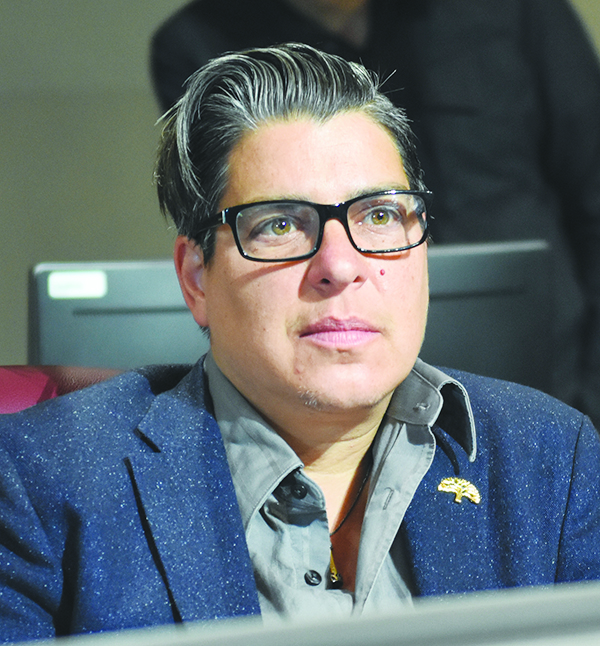City Government
Councilmembers, Community Groups Push Mayor for Funding for Homeless, Job Training and Trash Cleanup

Members of East Oakland Congress of Neighborhoods demand the city keep its promises to cleanup trash and illegal dumping. Photos by Ken Epstein.
As the City Council examines a “midcycle” revision of the city’s two-year budget, community groups are demanding the city allocate money to relieve the suffering of Oakland’s rapidly growing homeless population, clean up illegal dumping and trash in flatland neighborhoods, support job-training for low-income Oaklanders and fund social programs for vulnerable residents by reducing out-of-control spending on the Oakland Police Department.
The budget revisions were discussed at Tuesday’s special City Council meeting and are scheduled to be finalized at next week’s meeting, Tuesday, June 5.
Mayor Libby Schaaf and the City Administration, in a move that dampened demands for new spending coming from the community and some councilmembers, released a report showing that the 2018-2019 budget includes a projected deficit of $11 million.
To close the deficit, the City Administrator has asked departments to cut two percent of their expenditures.
At the same time the administration is proposing cuts, it is requesting the council adopt $31.3 million in new spending, including $1 million for the homeless, $27.5 million for new appropriations for affordable housing, $982,000 for trash cleanup, $1.6 million to hire three new staff in the Human Resources Department and conduct a Fire Academy, and $167,000 for two new employees for the Oakland Animal Shelter.
No mention was made in the City Administrator’s report of going over the budgeted spending limit for police overtime by $17 million, which more than accounted for the hole in the city’s budget.
Most of those who spoke at the meeting—residents and councilmembers—called on the city to fund concerns and community needs that they said had been shortchanged or ignored when the budget was adopted last year.
Rebecca Kaplan presented a list of new expenditures she is supporting, including cleanup crews for illegal dumping hot spots, public toilets and expanded support for homeless sanitation, job training and apprenticeship programs and support for the Oakland Animal Shelter.
Kaplan also requested changes in administrative practices that would not cost additional money but would require new ways of relating to the community: proactive trash pickup based on focusing on hotspots, not just responding to complaints; working with congregations and community-based organizations to establish alternative homeless encampments; and utilizing less costly security guards instead of police for City Hall security that is being requested by the administration.
The city needs to adopt real homeless solutions that “don’t just push the problem from one underpass to the next, at great expense,” she said.
She was also skeptical of the new horse-mounted police unit OPD is reportedly organizing. She asked: who authorized the “ponies”, how much money is being spent and what fund is the money coming from?
Kaplan also raised concerns that the administration has repeatedly failed to carry out resolutions the Council has passed.
“We on the Council should consider that what actually gets implemented is so different than what we voted for,” she said.
OPD overspending for police overtime “essentially accounts for the entire (budget) gap we are talking about,” she said.
Councilmember Noel Gallo proposed that he and his fellow Councilmembers help pay for homeless and trash services by contributing as much as much half of the $600,000 a year each of them receives from the city to operate their offices.
He also said Mayor Schaaf’s office budget is over $3 million. “The mayor should at least contribute a million dollars from her budget,” he said.
A large group from East Oakland Congress of Neighborhoods demanded full funding for their proposals to clean up flatland streets.
“Our children pass through piles of filthy, stinking garbage, human feces and the carcasses of dead animals to walk to school,” said Lidia, a spokesperson for the Congress.
“Some of you live in neighborhoods where this would never be allowed,” she said.
Carroll Fife, also speaking for the Congress, criticized the Mayor’s trash proposals.
“We see the proclamations the Mayor is making to the news media about the wonderful things that she is doing… to address the trash issue. We’re here to say it is not enough. It is not even real,” said Fife.
“You have to be honest with the residents of this city,” she said.
James Vann was one of the speakers with the Homeless Advocacy Working Group (HAWG), which is requesting $4.2 million to provide portable bathrooms, shower facilities and clean water at homeless encampments throughout the city.
The $1 million the Mayor is proposing for homeless services is “a pittance—that’s nothing, and it’s not (even) true,” said Vann.
He said the city’s proposed $1 million in new homeless spending is eaten up by the $500,000 the city owes for work on Tuff Sheds that is already completed. In addition, he said providing sanitary services at one site costs about $250,000 a year.
Speakers for the Anti Police-Terror Project (APTP) called for redirecting some of the money that currently goes to OPD, which accounts for about 43 percent of the general fund.
As little as $10 million taken from police spending would make a dramatic difference in services for the homeless and elimination of trash on the streets, ATPT speakers said.
Activism
Oakland Post: Week of December 18 – 24, 2024
The printed Weekly Edition of the Oakland Post: Week of December 18 – 24, 2024

To enlarge your view of this issue, use the slider, magnifying glass icon or full page icon in the lower right corner of the browser window. ![]()
Activism
City of Oakland Celebrates Reopening of Main Library
“Libraries are such critical facilities for all Oaklanders, whether it’s children coming to story-time, adults reading the newspapers or borrowing the latest novels, and people engaging with a range of services and programs that the library hosts,” said Council President and District 2 Councilmember Nikki Fortunato Bas. “Such library services and programs are only possible when the facility’s electricity, heating, roof, and lighting are fixed and running efficiently. I’m proud to join this re-opening of our Main Public Library.”

The branch had been closed since May for critical infrastructure upgrades
Special to the Post
The City of Oakland leadership and community partners gathered to celebrate the reopening of the Main Library after completion of critical infrastructure upgrades to enhance the library’s facilities and provide a better experience for patrons.
Renovations include new roof installation, skylight repair, critical electrical system upgrades, new boiler control system installation, auditorium heating and cooling system installation, and improvements to lighting, flooring and ceilings throughout the building.
“This is truly something to celebrate, the reopening of our wonderful Main Library! I congratulate the staff and our partners for this important project to make the Main Library a more comfortable place for everyone for years to come, said Oakland Mayor Sheng Thao. “Thank you to Oakland voters and the California State Library for making these crucial improvements possible.”
“Libraries are such critical facilities for all Oaklanders, whether it’s children coming to story-time, adults reading the newspapers or borrowing the latest novels, and people engaging with a range of services and programs that the library hosts,” said Council President and District 2 Councilmember Nikki Fortunato Bas. “Such library services and programs are only possible when the facility’s electricity, heating, roof, and lighting are fixed and running efficiently. I’m proud to join this re-opening of our Main Public Library.”
“Public libraries are a wonderful resource for our residents, offering a safe space for learning and being,” said District 3 Councilmember Carroll Fife. “It is critical to improve and modernize our libraries so more members of our community can utilize and enjoy them. I’m excited that the necessary renovations to the Main Library have been completed successfully and thank everyone involved, particularly the City team, who helped secured the necessary grant funds for this work.”
“I am proud of the City staff and project partners who kept this important project on schedule and under budget,” said Assistant City Administrator G. Harold Duffey. “The library is an incredibly important resource for our community members, and this project is an investment into the library’s future.”
“December 2nd was a momentous occasion for Oakland Public Library as we proudly reopened the doors of the Main Library following extensive infrastructure repairs,” said Director of Library Services Jamie Turbak. “Closing the Main Library for six months was no easy decision, as it serves as the central hub for our library system and is truly the heart of Oakland. Yet, this renovation was essential, representing more than just physical upgrades—it reflects our ongoing commitment to creating a safe, welcoming space for everyone.”
The City Administrator Jestin Johnson also attended the press conference and signalled his support for the completion of the record-setting completion of the renovations. Gay Plair Cobb, a newly appointed Library Commissioner said the Library represents the soul and brains of our community.
The Oakland Public Library secured funding for these crititcal repairs through a variety of sources. The California State Library’s Building Forward Library Facilities Improvement Program awarded the Main Branch $4.2 million. To comply with the grant terms, the City of Oakland provided matching funds through Measures KK, as approved by the Oakland City Council in October 2023.
The Main Library will host an Open House to celebrate the reopening on February 22, 2025, 10 a.m. – 5:00 p.m.
About the Oakland Public Library
The Oakland Public Library is a part of the City of Oakland in California and has been in existence since 1878. Locations include 16 neighborhood branches, a Main Library, a Second Start Adult Literacy Program, the Oakland Tool Lending Library, and the African American Museum and Library at Oakland (AAMLO). The Oakland Public Library empowers all people to explore, connect, and grow. Oaklandlibrary.org
Activism
BWOPA Honors Black Leadership and Legacy at 2024 Ella Hill Hutch Awards Dinner
On Dec. 5, BWOPA held its Annual Ella Hill Hutch Awards Ceremony, at the Fairmont Claremont Hotel in the Oakland/Berkeley Hills. At the event, the group comprised of Black women from various professional backgrounds, honored distinguished local and state leaders whose contributions have shaped civic engagement and advanced critical social issues impacting Black communities.

By Oakland Post Staff
Black Women Organized for Political Action (BWOPA) is a statewide non-profit advocacy and membership organization committed to solving problems affecting Black Californians.
On Dec. 5, BWOPA held its Annual Ella Hill Hutch Awards Ceremony, at the Fairmont Claremont Hotel in the Oakland/Berkeley Hills.
At the event, the group comprised of Black women from various professional backgrounds, honored distinguished local and state leaders whose contributions have shaped civic engagement and advanced critical social issues impacting Black communities.
The evening was hosted by Dr. Shawna Charles, founder of The Charles Communications Group (CCG) headquartered in Los Angeles. Charles served as mistress of ceremonies.
With a track record of elevating voices and empowering communities, Charles’ leadership and insight brought a certain dynamism to the celebration.
“Each year, this event not only celebrates the enduring legacy of our beloved BWOPA founding member, Ella Hill Hutch, but also reaffirms and amplifies our unwavering commitment to building and sustaining Black political power across California,” said Dezie Woods-Jones, BWOPA founding member and State president.
“Ella Hill Hutch’s trailblazing leadership continues to inspire us as we forge ahead, empowering Black women to lead, advocate, and shape a more equitable future for all,” added Woods-Jones.
This year’s event introduced the DWJ Rising Star Award, honoring young leaders like Solano County Board Supervisors-elect Cassandra James, Danielle Motley-Lewis, Naomi Waters and newly elected State Assemblymember elect Rhodesia Ransom (D-Stockton).
According to organizers, the awardees all exemplify “the next generation of changemakers.”
Other awardees included:
- Lifetime Achievement Awardees: Congresswoman Barbara Lee (D-CA-12) and Alameda County Supervisor Keith Carson
- Man of the Year: Kenneth Maxey, CEO of the Greater SF Bay Area Urban League
- President’s Corporate Award: Yvette Radford, Kaiser Permanente
- In the Spirit of Ella State and Chapter Awards: Dr. Carolyn Greene, Dr. Marcella K. Smith, Dr. Carolyn Drake, Tinisch Hollins, Jackie Jones, Gloria Burgess Johnson, Tamika L’Ecluse, Ellen Nash, Betty Reid Soskin, and Ay’Anna Moody.
BWOPA also celebrated local champions across its chapters, including leaders in voter education, healthcare, criminal justice reform, and community advocacy.
In a statement, BWOPA said, “Honoring Ella Hill Hutch’s legacy, BWOPA recognizes her pioneering efforts as the first Black woman elected to the San Francisco Board of Supervisors. Her tireless work amplifying underrepresented voices continues to inspire BWOPA’s mission to build Black political power across California.”
“We extend our heartfelt thanks to our members, partners and allies who believe in BWOPA’s vision to invest in building power for Black women’s leadership,” said LaNiece Jones, BWOPA State executive director. “Your support ensures that Black women have a voice at decision-making tables locally, regionally, statewide, and nationally, advancing diversity and equity in leadership spaces.”
-

 Activism4 weeks ago
Activism4 weeks agoOakland Post: Week of November 20 – 26, 2024
-

 California Black Media4 weeks ago
California Black Media4 weeks agoCalifornia to Offer $43.7 Million in Federal Grants to Combat Hate Crimes
-

 Black History4 weeks ago
Black History4 weeks agoEmeline King: A Trailblazer in the Automotive Industry
-

 California Black Media4 weeks ago
California Black Media4 weeks agoCalifornia Department of Aging Offers Free Resources for Family Caregivers in November
-

 California Black Media4 weeks ago
California Black Media4 weeks agoGov. Newsom Goes to Washington to Advocate for California Priorities
-

 Activism4 weeks ago
Activism4 weeks agoOCCUR Hosts “Faith Forward” Conference in Oakland
-

 Activism3 weeks ago
Activism3 weeks agoOakland Post: Week of November 27 – December 3, 2024
-

 Activism4 weeks ago
Activism4 weeks agoRichmond Seniors Still Having a Ball After 25 Years


















































